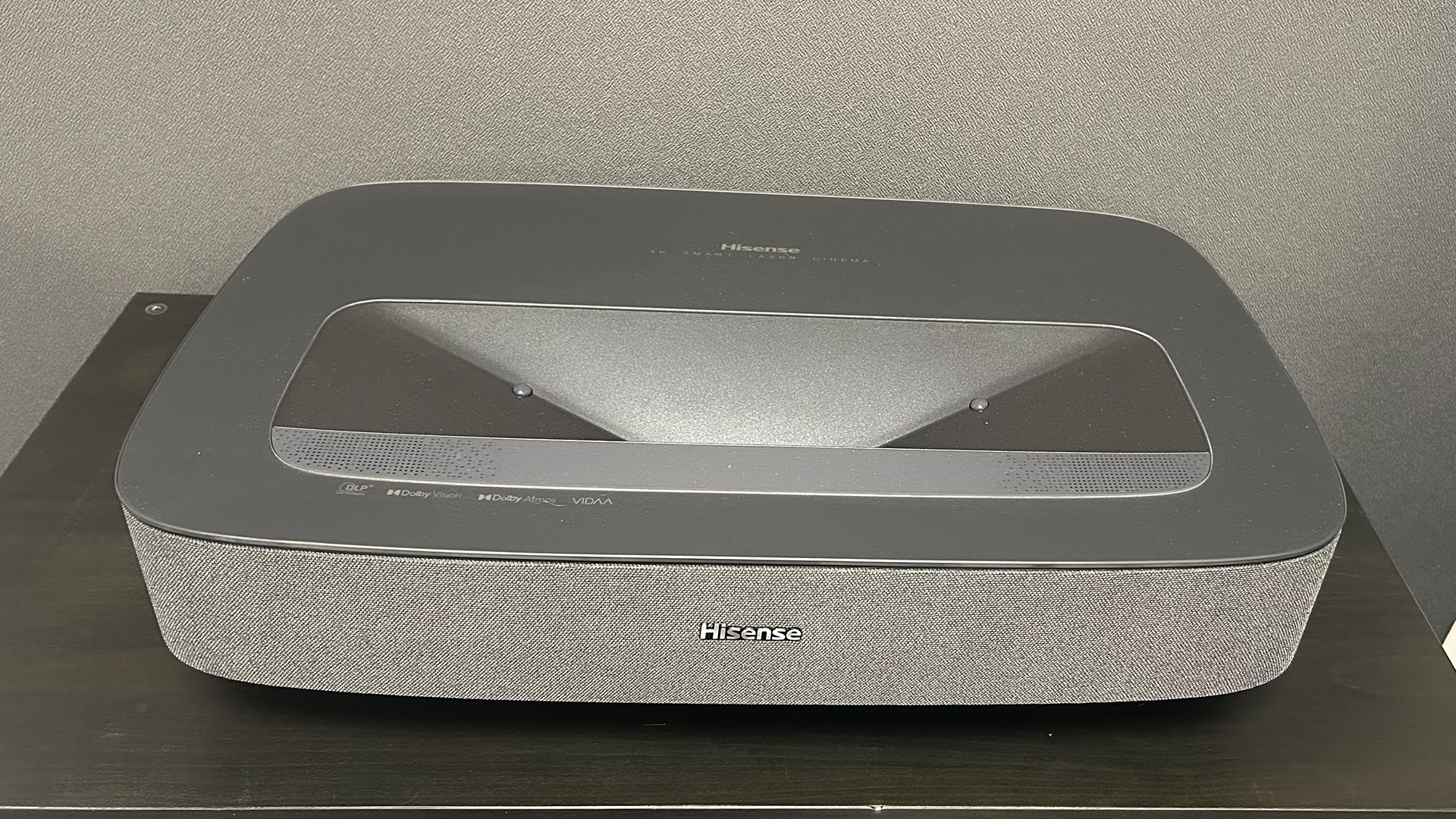What Hi-Fi? Verdict
Hisense has delivered big-screen cinematic thrills with TV convenience on the PL1, all while undercutting its competitors when it comes to price
Pros
- +
Sharp and vibrant picture
- +
Solid smart feature integration
- +
Cheaper than nearly all rivals
Cons
- -
Only two HDMI connections
Why you can trust What Hi-Fi?
Ultra short-throw projectors are becoming much more frequent within the projector market at large, and for good reason. Designed as a TV alternative that can reach up to 100 inches without costing nearly as much as a super-large TV would, as well as having the added benefit of being practically plug-and-play (obviously with some fiddling required), a UST projector strikes a nice balance between practicality and theatricality.
At the forefront of this UST revolution is Hisense, which has been developing ultra short-throw models for over six years now. The PL1 that we have before us today is the latest model in Hisense’s line of Ultra Short-Throw Laser Cinema Projectors, not to be confused with its separate line of Laser TVs, which act in a similar fashion but specifically come with a dedicated screen.
In order to be a successful UST, it has to tick every box we look out for in both the best projectors and the best TVs, which is no easy task. Thankfully, the PL1 not only steps up to the task, but it clears many other options within its field.
Price
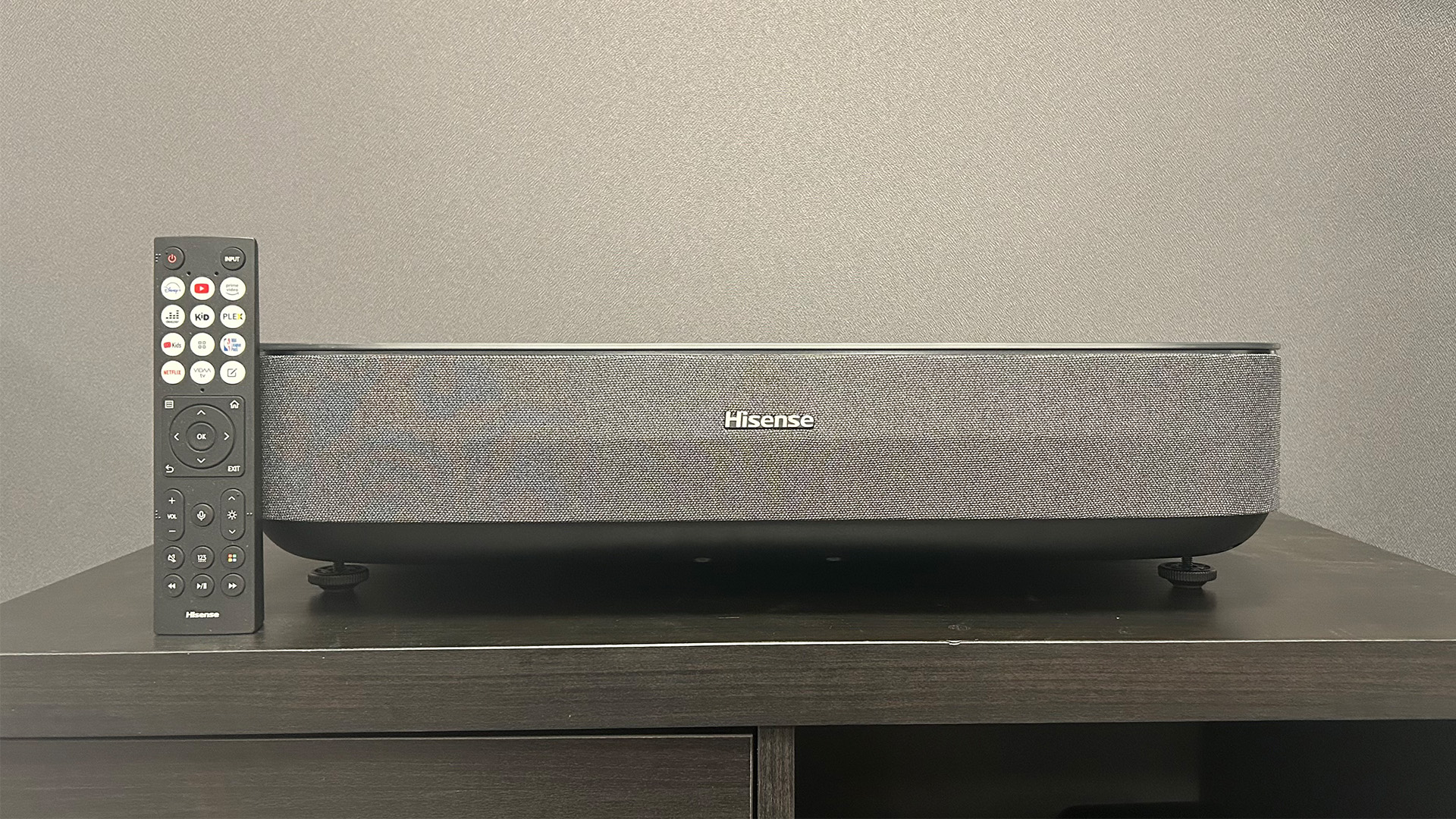
Locking down the price of the PL1 is trickier than first anticipated. While it’s currently available for £1999 / $2500 / AU$2995, we’ve seen that figure fluctuate, sometimes closer to £1800 or even as low as £1500 in the UK. When questioned about this, Hisense states that aggressive pricing is its aim and that it will likely drop during big sale events such as Black Friday.
Looking at alternatives near this price, it’s not easy to find a UST that matches these specs. Even last year’s Award-winning UST, the LG Cinebeam HU715Q, which has since been discontinued, was a fair bit more expensive at £2999 / $3000 / AU$5795. Samsung’s The Premiere LSP9T is one of our only other points of reference and that too is much more expensive at £3999 / $3500 / AU$8999.
Build
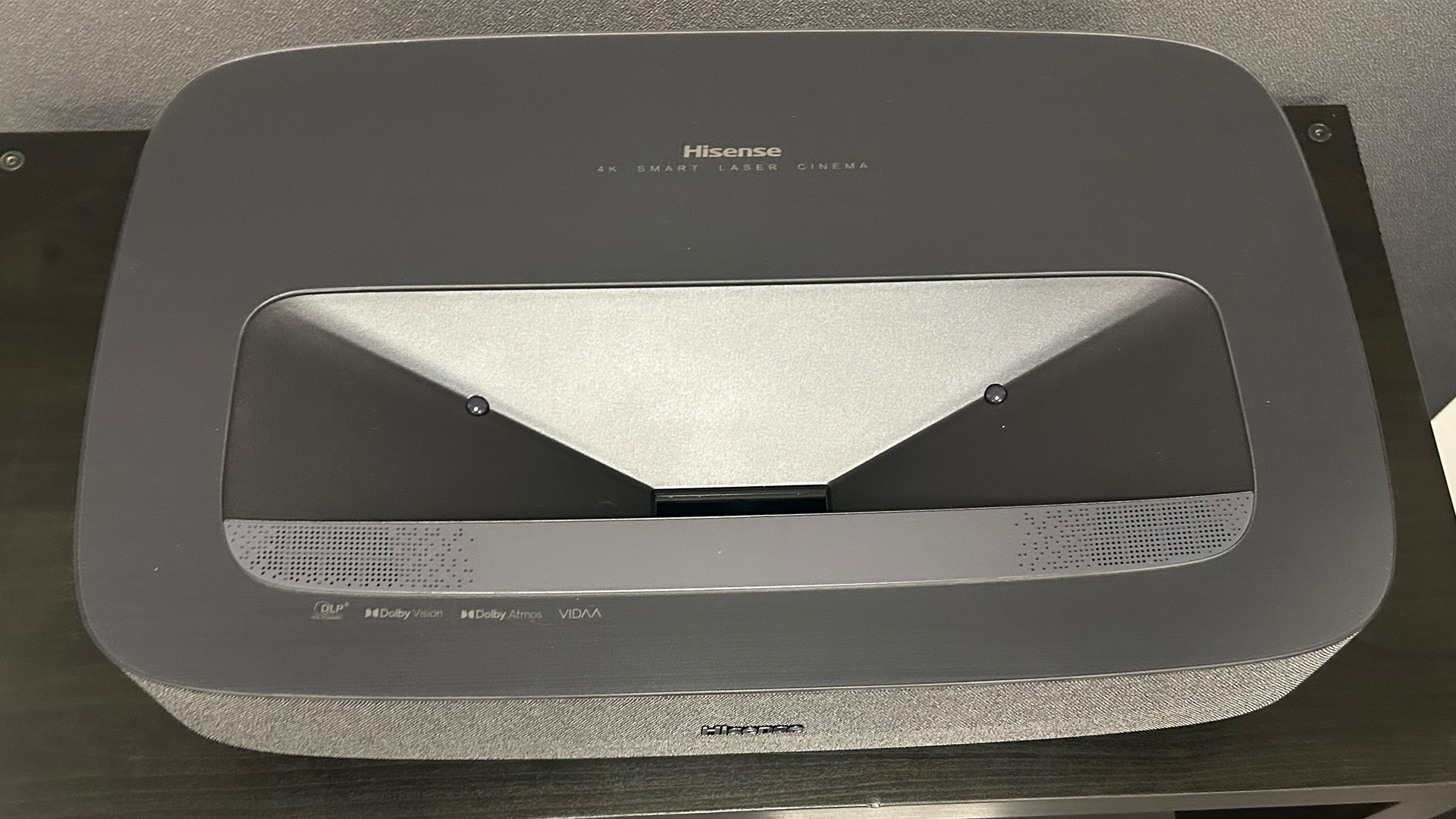
Structurally, the Hisense PL1 starts on a strong foot. It’s much smaller than other UST projectors we’ve seen before, measuring in at 37 x 55 x 16cm (hwd) – roughly akin to a home office printer in stature. This is a bonus for two reasons; the first is that it’ll be unobtrusive in your home and the second is that it's easy to manoeuvre during set-up.
On the subject of set-up, you’ll find adjustable feet on the bottom of the PL1 that can be used for tweaking the picture positioning, but there are no physical lens controls here, meaning we’re relying on keystone and digital picture correction.
Thankfully, both of those systems are easy to use and adept at getting the picture squared off and sharp. There is an option to use smartphone-assisted picture correction, something that involves taking a picture of your screen and submitting it to a rather barebones-looking website, which then remotely adjusts the picture. Perhaps there’s a certain knack to this process that we just can’t seem to nail, but every time we try this process we’re met with a comically skewiff image.
Aesthetically, the Hisense impresses too, which is more important than you may think. Remember, this box will sit in direct view when you’re using it, so it’s important that it’s not an eyesore. Thankfully, Hisense’s tasteful design language on the PL1 is understated enough to blend into most living room environments as well as having enough subtle design elements such as the mesh front grille and triangular cutout vents on the sides of the unit to give it a bit of character.
Features
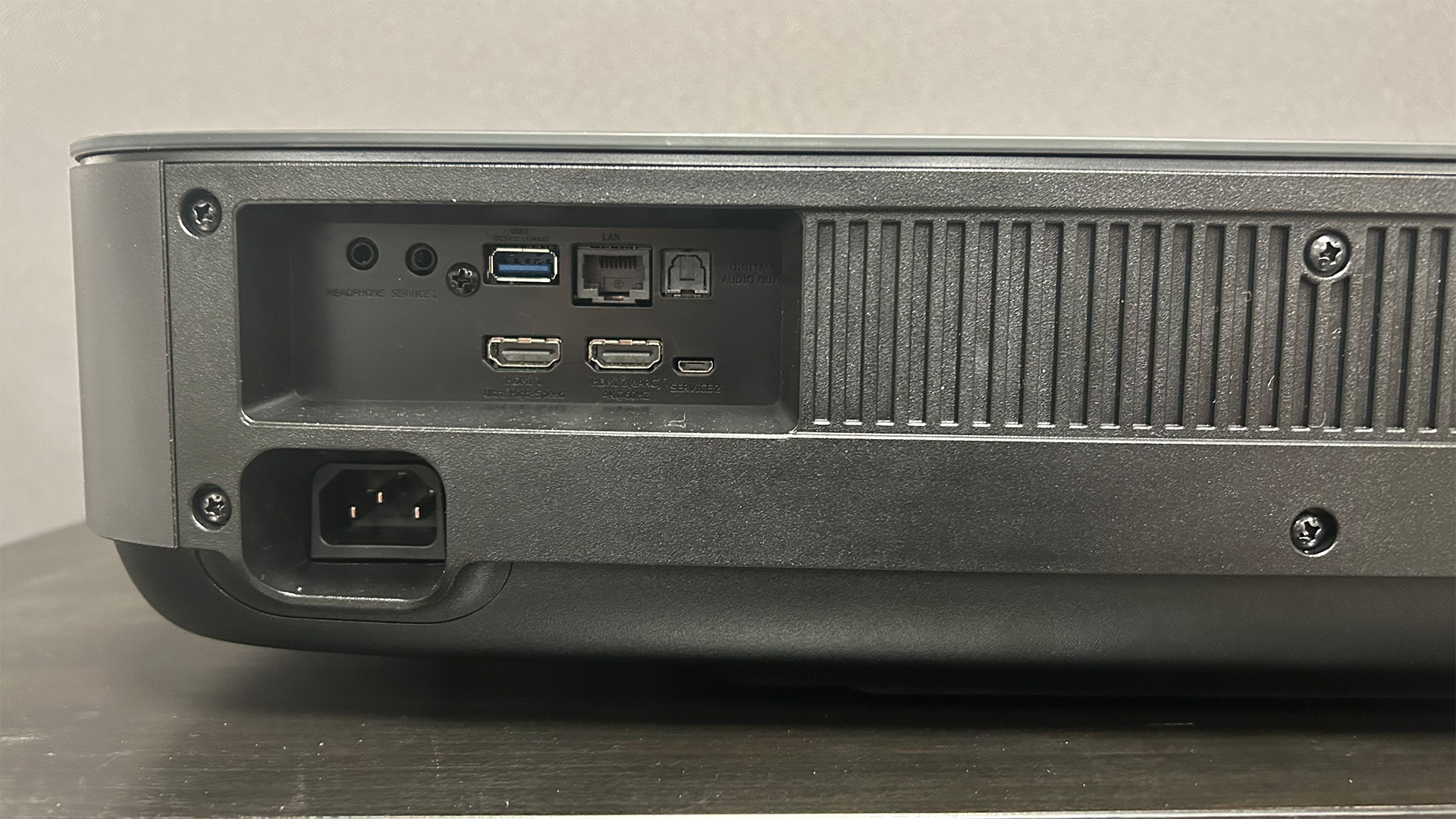
Anyone familiar with a Hisense TV will likely feel right at home on the PL1. For starters, it uses the exact same VIidaa operating system, which also includes practically every streaming app we could hope for; including (but not limited to) Netflix, Disney Plus, Amazon Prime Video and Apple TV. You can also stream wirelessly from your smartphone using device pairing or Apple AirPlay 2 if you’re using an iPhone. On the subject of phones, there is a comprehensive VIidaa app that you can use to fully control the projector, which is a nice touch.
It's worth noting that this isn't the case in the US, as the PL1 variant in the States runs Google TV. While it might be easy to see this as a disadvantage for UK and Australian customers, it's worth noting that VIidaa has become a fully-featured and user-friendly operating system since its conception, and while we do prefer Google TV overall, it's certainly not a detriment to the Hisense.
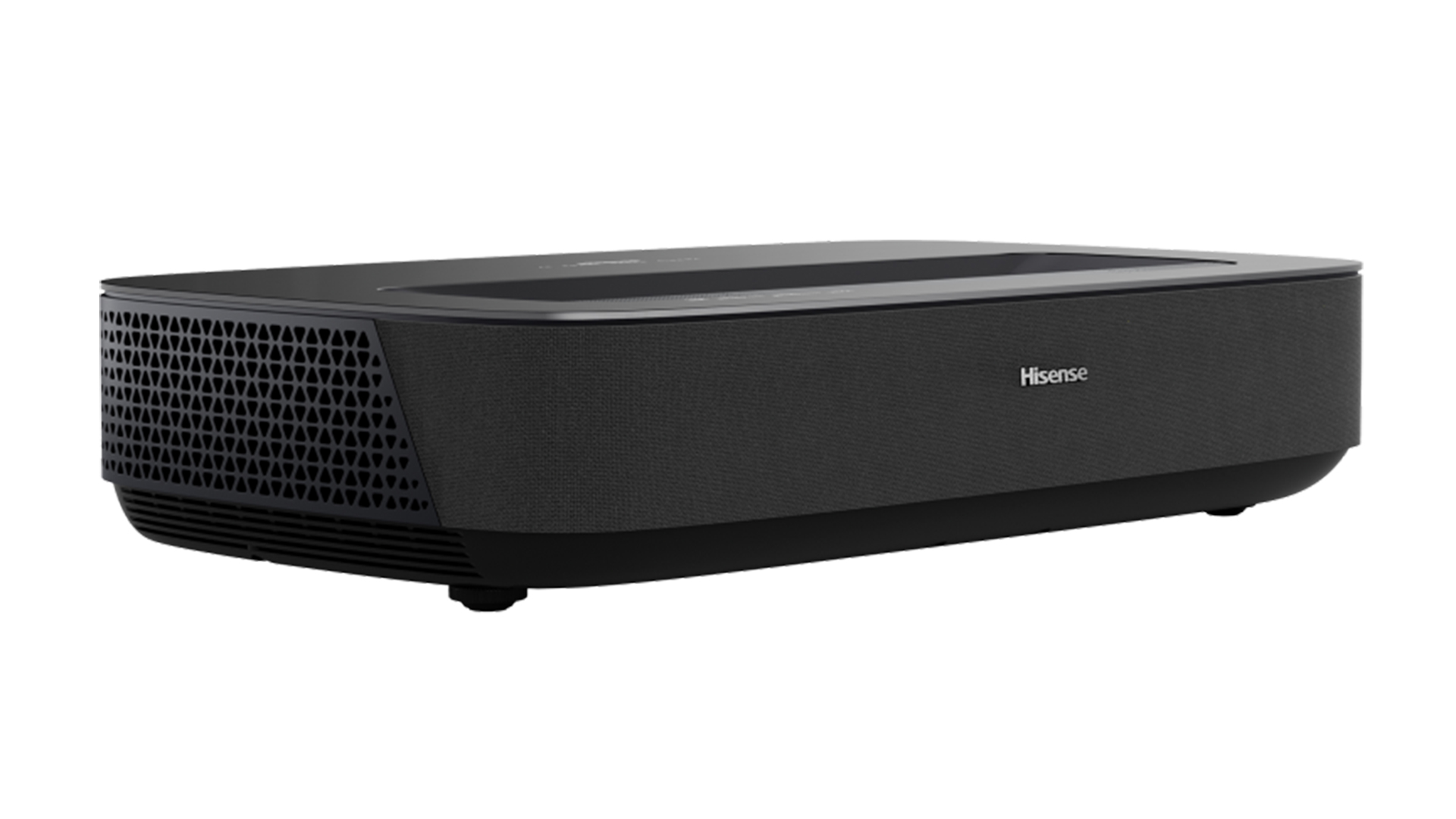
Resolution 4K (3840 x 2160)
HDR Dolby Vision, HDR10, HLG
Light source X Fusion Laser
Operating system VIDAA
Picture size 90-130 inches
Contrast 2,000,000 : 1 dynamic contrast ratio
Brightness 2100 ANSI lumens
HDMI 2 x HDMI 2.1
Onto the display features of this unit, it uses Hisense’s X-Fusion Laser Technology, which we assume is merely branding slang for a laser light source. Either way, it's capable of reaching an impressive 2100 ANSI-Lumens and is rated for up to 25,000 hours of use which roughly translates to nearly three years of continuous use. Built into the projector is an eye-saver mode, which is turned on by default; this automatically turns the light source off when it detects you nearby, ensuring you don’t receive any unsolicited accidental laser eye surgery.
The PL1 also features a variable screen size from 80-inches all the way up to 120-inches. As for picture features, it has a resolution of 4K using pixel shifting, as well as HDR support in the HDR10, Dolby Vision and HLG formats.
Sound features are also solid, with two built-in 15W drivers, and better yet they’re front-facing for a more direct sound. We’ll take a closer look at these shortly, but you won’t have to rely on them solely thanks to the inclusion of HDMI eARC. This means you’ll be able to hook it up to an AVR and home cinema speaker package, or to a Dolby Atmos soundbar as the PL1 also supports the immersive audio format.
On the subject of HDMI, we can take a look at the connectivity on this UST. Truthfully, it's a bit of a letdown, with only two HDMI connectors alongside an optical audio output, mini jack audio output, two USB ports, a networking interface and an ethernet port. While both of those HDMI ports are the latest 2.1 standard, it's disappointing to see just two ports overall.
With HDMI 2.1 on board, we’d expect the PL1 to take advantage of the latest gaming specs, but unfortunately, this isn’t the case. There’s no 4K/120Hz here, with the projector maxing out at 60Hz, although Hisense does stress that gaming performance at 4K/60Hz is still enjoyable with a claimed input lag of less than 60ms. The saving grace is the Game Mode preset, which activates some of the latest gaming features such as ALLM.
Picture
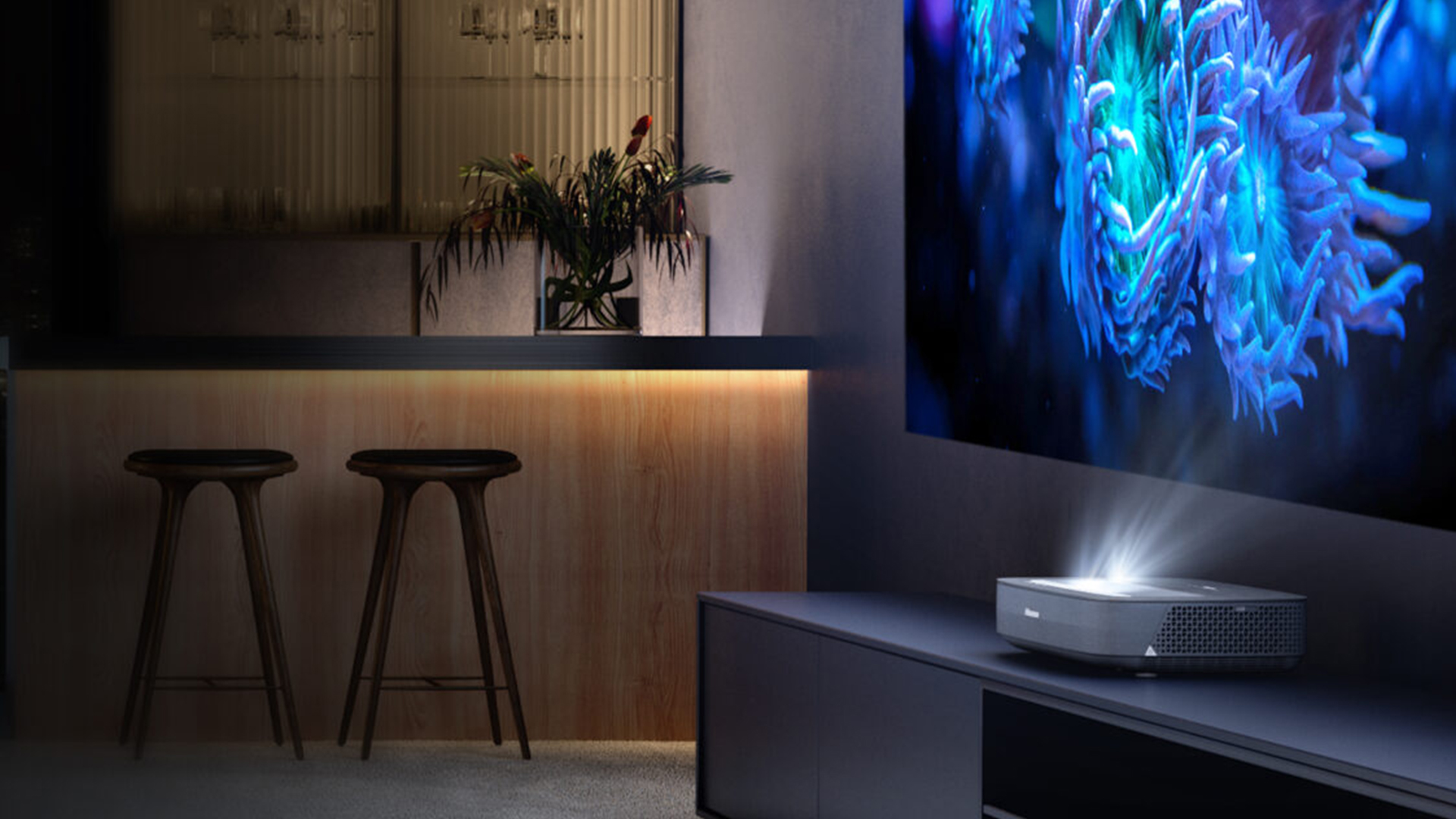
Despite being cheaper than practically all of its competitors, the Hisense seriously holds its own in the battle of the USTs when it comes to picture performance. We’re more than impressed with its sharp, punchy and cinematic image, as well as its adept handling of motion. We’re using the Filmmaker mode preset, which provides the most authentic picture, although we have cranked up the motion setting slightly in order to smooth out a little bit of judder.
Starting with Baby Driver, the Hisense leaps into action with a solid and punchy picture. The red Subaru Impreza gleams on screen while the monochromatic outfits of the bank-robbing crew look impressively black, especially by projector standards. As the shot transitions to the titular Baby rocking out in the front seat of the getaway car, we see how solid the PL1’s image is. Sharp outlines, competent handling of contrast and crisp details combine to create a three-dimensional depth effect that is impressively cinematic.
While we have seen sharper 4K TVs in our time, the Hisense does a good job of reproducing finer details, such as subtle skin textures on Baby’s face and the various intricate switches and knobs on the car’s dashboard. What’s more impressive is how the projector handles motion: when the chase quite literally kicks into high gear, the projector follows suit. While the getaway car zips around the streets of Atlanta, we don’t see it stutter or judder even with other fast-moving subjects and erratic camera movements.
Moving onto Drive, we’re using the opening sequence to distinguish how the projector handles dark details – the duo of getaway-driving-themed movies we’ve used is merely a coincidence. As the Driver stalks the seedy, dark streets of Los Angeles attempting to evade police while transporting a duo of thieves, we can pick out details on the Impala’s dashboard, as well as subtle wrinkles on the Driver’s jacket while he’s bathed in shadow.
In a later scene where the Driver meets with the love interest of the film, Irene, in a supermarket, we find that the PL1 is capable of a more natural and less showy presentation where needed, with a pleasing emphasis on details within the clothing textures of the denim jacket worn by the protagonist. There is once again a pleasing depth to the image, and colours throughout the scene still lean towards the punchy side but remain natural and realistic at the same time.
Overall, the Hisense thoroughly impresses when it comes to picture performance, offering a more cinematic presentation than most TVs without sacrificing too much in the way of clarity or black depth.
Sound
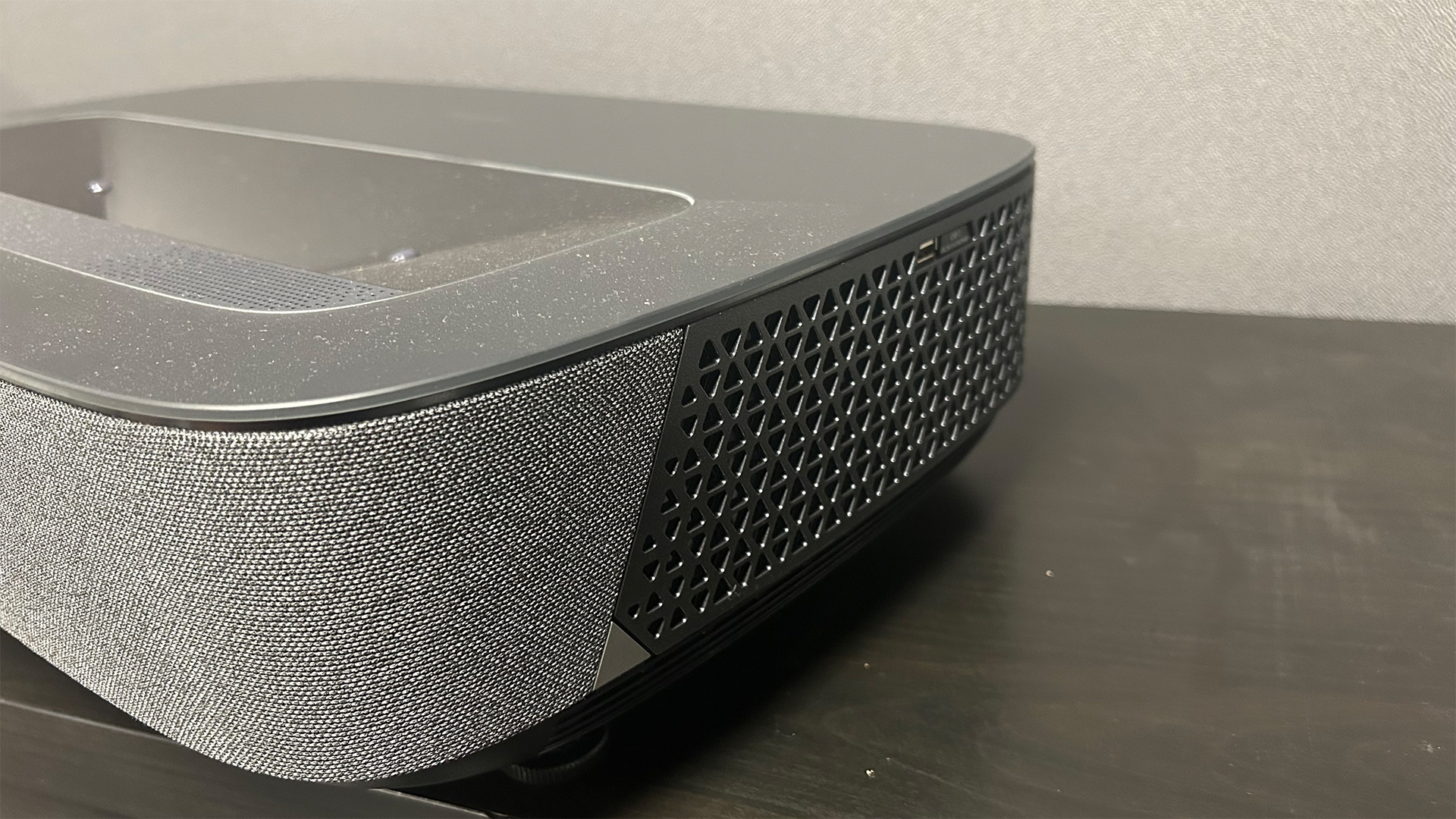
Much like many other projectors and TVs, the built-in sound of this unit isn’t groundbreaking but it is more than serviceable. There are a few sound modes to choose from, with a theatre preset offering a wider scale of sound, but leaving it on the original preset is likely the best way to go if you want to prioritise dialogue clarity.
Overall, the PL1 attempts some directionality with the sound when it comes to cars passing by the titular character in Baby Driver and there is some semblance of bass, although there’s not a huge amount in the way of dynamics and detail to the sound. Realistically you’ll want to hook up a soundbar or AVR if you have one; that being said, the Dolby Atmos-certified built-in speakers will work just fine if you’re watching an episode of a TV show or even watching the odd movie.
Verdict
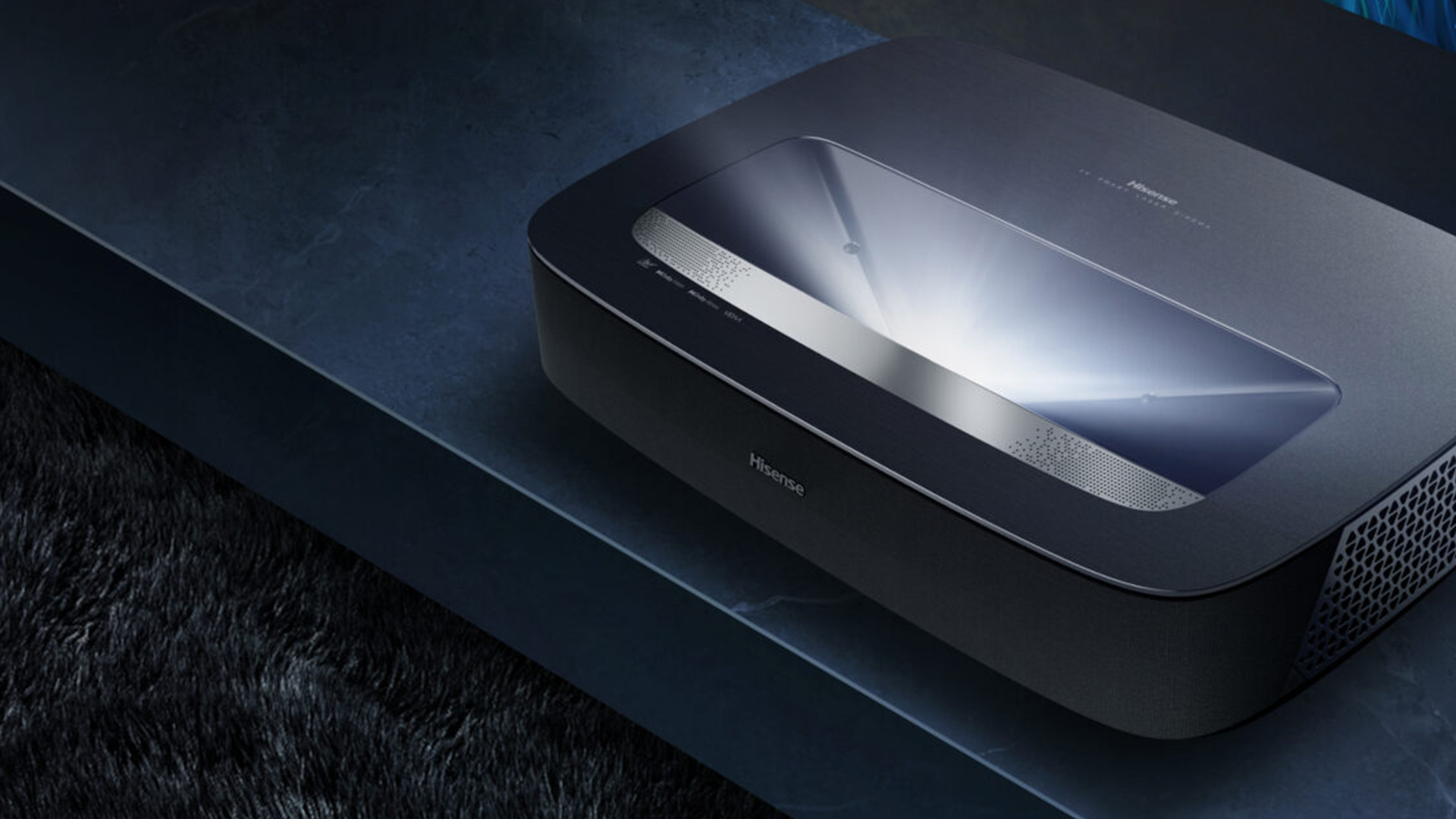
With its clean, punchy and solid image, the Hisense PL1 is a gem at this price. Undercutting many of its UST rivals and even its own Hisense siblings, it's a TV alternative that actually lives up to its promise. You’d be hard-pressed to find a 100-inch TV for this price, let alone one that features such a punchy and crisp image. While we wish it had a couple more HDMI ports, it’s a compromise we’re willing to make, as its picture performance more than makes up for it.
Review published: 2023. Review updated: November 2024.
SCORES
- Picture 5
- Sound 4
- Features 4
MORE:
Read our review of the Samsung The Premiere
Also consider the Epson EH-TW7100
What Hi-Fi?, founded in 1976, is the world's leading independent guide to buying and owning hi-fi and home entertainment products. Our comprehensive tests help you buy the very best for your money, with our advice sections giving you step-by-step information on how to get even more from your music and movies. Everything is tested by our dedicated team of in-house reviewers in our custom-built test rooms in London, Reading and Bath. Our coveted five-star rating and Awards are recognised all over the world as the ultimate seal of approval, so you can buy with absolute confidence.
